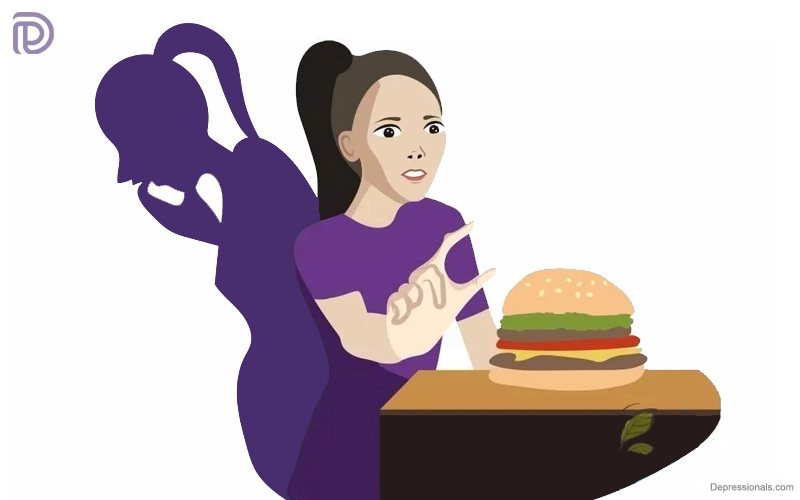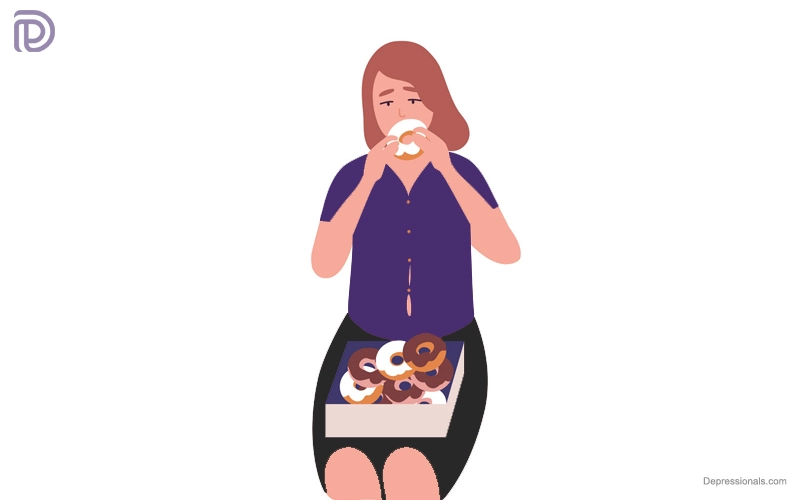Binge eating disorder (BED) is a type of feeding and eating disorder that is now officially recognized. It affects about 2% of the world’s population and can lead to other health problems connected to food, such as diabetes and high cholesterol.
Feeding and eating disorders are classified as mental disorders since they are not only related to food. People usually develop them as a coping mechanism for a deeper issue or a psychological disorder like worry or depression.
The symptoms, causes and health concerns of BED are discussed in this article, as well as how to get treatment and support to overcome it.
What is binge eating disorder?
Even if they aren’t hungry, people with BED may consume a large amount of food in a short period of time. Emotional tension or distress frequently plays a role and might lead to binge eating.
During a binge, a person may feel satisfied or relieved, but afterward, they may feel ashamed or lose control.
Read: Pica in Pregnancy
Difference between binge eating disorder and other eating disorders
There are many types of eating disorders that affect the way women eat, and how they exercise, such as binge eating disorder, bulimia, and anorexia. The health of these people is at risk due to these eating disorders.
As opposed to anorexia and bulimia, binge eating disorder does not involve throwing up food, excessive exercise, or starvation. There is a high prevalence of overweight or obesity among people with binge eating disorders. The condition does not necessarily occur in overweight people with binge eating disorders, just as it does not necessarily occur in overweight people with binge eating disorders.
Multiple eating disorders can occur during a person’s lifetime. Treatment can help you overcome eating disorders no matter what type you have.
Binge eating disorder symptoms
Three or more of the symptoms must be active for a health professional to diagnose BED:
- Eating at a considerably faster rate than usual
- Consuming food till he or she is uncomfortably full
- Consuming a huge amount of food without being hungry
- Eating alone to avoid embarrassment and shame
- Sentiments of regret or hatred towards oneself
People with BED frequently express significant dissatisfaction and discomfort over their eating habits, body shape and weight.
Causes of binge eating disorder
Binge eating disorder is caused by a variety of factors.
The causes of BED remain unknown. A number of genetic, environmental, social and psychological factors are linked to the development of this eating disorder, as they are with other eating disorders.
Although, it is thought to be caused by a number of risk factors, including:
- Genetics: BED patients may have high sensitivity to dopamine, a brain neurotransmitter that causes emotions of reward and pleasure. There is also significant evidence that the disease is passed down through the generations.
- Gender: Women are more likely than males to have BED. In the United States, 3.6 percent of women and 2.0 percent of men suffer BED at some point in their life. This may be related to underlying biological issues.
- Changes in the brain: There are signs that persons with BED may have structural abnormalities in their brains that cause them to have a stronger reaction to food and less self-control.
- Body size: Obesity affects over half of persons with BED, and 25–50 percent of patients considering weight loss surgery fulfill the BED criteria. Weight issues can be a cause as well as a symptom of the disease.
- Body image: People who suffer from BED frequently have a poor perception of themselves. The condition is caused by body dissatisfaction, dieting and overeating.
- Binge eating: Binge eating is frequently reported as the initial sign of the condition by those who are affected. Binge eating throughout childhood and adolescence is one example of this.
- Emotional trauma: Abuse, mortality, being separated from a family member, or being in a vehicle accident are all risk factors. Bullying based on weight during childhood may also play a role.
- Other mental health issues: Nearly 80% of patients with BED also have depression, phobias, bipolar disorder, post-traumatic stress disorder (PTSD), substance abuse and anxiety.
Stress, dieting, bad thoughts about body weight or form, food availability, or boredom can all cause an episode of binge eating.
Read: Avoidant Restrictive Food Intake Disorder
How is BED diagnosed?
While some people may overeat on occasions, such as during Thanksgiving or a party, this does not necessarily indicate that they have BED, even if they exhibit some of the symptoms described above.
BED usually begins in late adolescence or early adulthood, although it can strike at any age. In general, people require assistance in overcoming BED and developing a positive connection with food. BED can continue for years if left untreated.
A person must experience at least one binge eating episode each week for at least three months to be diagnosed with binge eating disorder.
The severe ranges from low to high, with light being defined as one to three binge eating events per week and serious as 14 or more episodes per week.
Another major feature is the failure to take steps to “undo” a binge. This implies that, unlike bulimia, an individual with BED does not vomit, use laxatives or over-exercise in order to avoid a binge.
It is more frequent in women than in males, like with other eating disorders. Therefore, it is more frequent in males than other eating disorders.
What are the health effects?
BED is linked to a number of serious physical, mental and social health concerns.
Obesity affects up to 50% of patients with BED. The condition, on the other hand, is an independent risk factor for weight gain and obesity. This is related to the higher calorie intake that occurs during binge episodes.
Obesity raises the risk of cancer, heart disease, type 2 diabetes and stroke on its own.
However, other studies have indicated that persons with BED have an even higher chance of developing these health issues than those who are obese but do not have BED.
Sleep difficulties, chronic pain issues, asthma and irritable bowel syndrome are some of the other health hazards connected with BED (IBS).
The disease is linked to a higher risk of infertility, pregnancy difficulties and the occurrence of polycystic ovary syndrome in women (PCOS).
Persons with BED, as compared to people without the illness, report difficulties with social relationships, according to research.
In addition, as compared to those who do not have a feeding or eating problem, people with BED have a higher risk of hospitalization, outpatient treatment and emergency department visits.
Despite the seriousness of these health hazards, there are a variety of effective therapies for BED.
Read: Purging Disorder
Binge eating disorder treatment
The treatment strategy for BED is determined by the reasons and severity of the eating disorder, as well as the patient’s goals.
Treatment may focus on binge eating, body image, excess weight, mental health concerns or a combo of these.
Some examples of therapies are dialectical behavior therapy, cognitive-behavioral therapy, weight loss therapy, interpersonal psychotherapy and medication. These can be done one-on-one, in a group environment or as part of a self-help program.
Some people may only need one type of treatment, while others may need to experiment with numerous combinations until they find the ideal match.
A medical or mental health expert can help you choose a treatment plan that is right for you.
Read: How to Stop Late Night Eating
Cognitive-behavioral therapy
Cognitive-behavioral therapy (CBT) examines the connections between negative feelings, thoughts and actions linked to food, body shape and weight.
Once the origins of unpleasant feelings and patterns are recognized, strategies to assist people to overcome them may be proposed.
Setting objectives, self-monitoring, establishing regular eating patterns, altering ideas about self and weight, and supporting good weight-control practices are all examples of specific treatments.
CBT guided by a therapist is shown to be the most effective treatment for BED. According to one research, 79 percent of patients were no longer binge eating after 20 sessions of CBT, and 59 percent were remained effective after a year.
Another approach is to use guided self-help CBT. Participants in this format are generally given a manual to work through on their own, as well as the option to meet with a therapist for extra guidance and goal-setting sessions.
Self-help therapy is frequently less expensive and more convenient and there are websites and mobile apps that might help. Traditional CBT has been found to be ineffective. However, self-help CBT has been said to be effective.
Read: 15 Simple Tips to Stop Binge Eating
Interpersonal psychotherapy
Interpersonal psychotherapy (IPT) is based on the theory that binge eating is a coping strategy for unresolved personal difficulties such as bereavement, interpersonal disputes, major life changes or underlying social problems.
Over the duration of 12–16 weeks, the objective is to discover the exact problem that is connected to the poor eating pattern, accept it, and then make positive adjustments.
Therapy can take place in a group setting or one-on-one with a professional therapist, and it is frequently coupled with CBT.
There is significant evidence that this form of therapy reduces binge eating behavior in both the short and long term. It is the only other treatment that has comparable long-term results as CBT.
It may be especially beneficial for those who suffer from severe binge eating and have low self-esteem.
Read: What is Night Eating Syndrome
Dialectical behavior therapy
According to dialectical behavior therapy (DBT), binge eating is viewed as an emotional reaction to bad situations that the individual has no other means of coping with.
It teaches people how to control their emotional reactions so that they can deal with stressful circumstances in their daily lives without bingeing.
DBT treatment focuses on four essential areas: distress tolerance, interpersonal effectiveness, emotion regulation and mindfulness.
According to a study of 44 women with BED who received DBT, 89 percent of them quit binge eating at the conclusion of therapy. However, this number decreased to 56 percent at the 6-month follow-up.
However, research on DBT’s long-term efficacy and how treatment compares to CBT and IPT are lacking.
While the study on this therapy is encouraging, additional research is needed to see if it can be used by everyone with BED.
Read: Rumination Disorder
Weight loss therapy
Behavioral weight loss therapy tries to help patients lose weight, which can help them stop binge eating by increasing their self-esteem and body image.
The goal is to gradually implement healthy lifestyle changes in terms of nutrition and exercise, as well as track food intake and food-related thoughts throughout the day. A weekly weight reduction of around 1 pound (0.5 kg) is predicted.
While weight loss treatment has been demonstrated to assist improve body image and reduce weight as well as the health concerns related to obesity, it has never been shown to be as successful in preventing binge eating as CBT or IPT.
Behavioral weight loss therapy, like normal obesity treatment, has been demonstrated to help patients lose weight in a short-term, moderate way.
However, it may be a viable choice for those who have not had success with other treatments or who are solely interested in decreasing weight.
Read: Cheek Biting Disorder
Medications
Several medicines for binge eating have been discovered, and they are frequently less expensive and quicker than standard therapy.
However, no current medicines are as successful as behavioral treatments in treating BED.
Antidepressants, antiepileptic medicines like topiramate, and drugs used to treat hyperactivity problems like lisdexamfetamine are among the therapies available.
According to studies, medicines outperform a placebo in terms of reducing binge eating in the short run. Medicines were shown to be 48.7% effective, whereas placebos were only 28.5 percent effective.
They may also help with hunger, obsessions, compulsions, and depressive symptoms.
Although these benefits appear to be encouraging, the majority of research has only been done for short periods of time, thus more evidence on long-term impacts is needed.
Treatment may also cause headaches, gastrointestinal issues, sleep disruptions, elevated blood pressure and anxiety.
Because many individuals with BED also have other mental health issues like anxiety or depression, they may need to take extra drugs to manage these as well.
Read: Lip Biting Disorder
How to overcome binging
Speaking with a medical expert is the first step in overcoming binge eating. This person can assist in diagnosis, determining the severity of the illness and recommending the best treatment option.
CBT is the most successful treatment in general, although there are a variety of options. Depending on the conditions, one therapy or a mix of therapies may be the most effective.
It is critical to make good lifestyle and nutrition choices whenever feasible, regardless of whatever treatment method is chosen.
Here are a few more useful strategies:
- Keep a food and mood diary: Learning how to manage binging urges begins with identifying personal triggers.
- Practice mindfulness: This can help you become more aware of your binge-triggers while also improving self-control and self-acceptance.
- Find someone with whom you can talk: Support is essential, whether it comes from a spouse, family, a friend, online or binge eating support groups.
- Choose healthy foods: A diet rich in protein and healthy fats, as well as frequent meals and whole foods, can assist to satisfy hunger and offer essential nutrients.
- Start exercising: Exercise can help you lose weight, improve your body image, decrease anxiety symptoms and improve your mood.
- Get enough sleep: Sleep deprivation is linked to increased calorie intake and unpredictable eating behaviors. It is suggested that you sleep for at least 7–8 hours each night.
Read: Onychophagia (Nail Biting)
Complications
The effects of binge eating may be psychological as well as physical.
An individual suffering from the binge-eating disorder may suffer from the following complications:
- Living conditions are poor
- Working or socially functioning problems
- Social isolation
- Obesity
- Obesity-related diseases include joint problems, heart problems, type 2 diabetes, gastroesophageal reflux disease (GERD), and some sleep-related breathing disorders
These are some of the most common psychiatric disorders associated with binge-eating disorder:
- Depression
- Bipolar disorder
- Anxiety
- Substance use disorders
Prevention
You should seek professional help if you experience the symptoms of binge-eating disorder. There are several places where you can get help based on the advice of your medical provider.
You should encourage someone you love to adopt healthier eating habits and seek professional treatment if you believe they may be having a binge-eating problem. You must take the following steps if you have a child:
- Make sure you foster a healthy image of yourself, regardless of your body shape or size
- It is important to also make sure your child’s primary care provider is aware of any concerns you have, as he or she may be able to detect early signs of an eating disorder and prevent it from developing
In conclusion
Binge eating disorder (BED) is a prevalent feeding and eating disorder that can have significant health consequences if left untreated.
It’s characterized by periods of binge eating that are uncontrollable and typically followed by emotions of shame and guilt.
It has the potential to harm one’s general health, body weight, self-esteem, and mental well-being.
BED treatments, including CBT and IPT, are fortunately extremely successful. In addition, several healthy lifestyle techniques may be implemented in daily life.
Asking for help from a medical expert is the first step toward overcoming BED.






I am genuinely thankful to the owner of this site who
has shared this wonderful article at here.
Also, our assignment authors around the world are well learnt their selected discipline which indicates you can conveniently put your faith in the method they treat your paper, despite which scholastic self-control you’re from.
This is really interesting, You are a very skilled blogger. I’ve joined your rss feed and look forward to seeking more of your excellent post. Also, I have shared your website in my social networks!